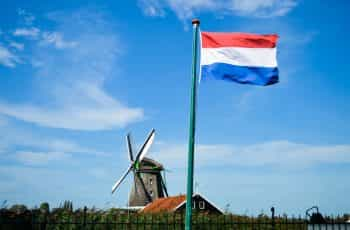KSA Reveals Licensing Process
The gambling regulator in the Netherlands, the Kansspelautoriteit (KSA), has outlined how prospective operators will apply for licenses in the regulated market. These terms and conditions that licensees will be expected to adhere to have been announced in the build-up to the implementation of the new Remote Gambling Act that will come into effect in Holland as of March next year. As part of their applications, operators will be required to provide the regulator with the policies they implement as part of their business and how the “cooling off” requirements will be met.

There has been a large amount of upheaval in the Netherlands with respect to its gambling legislation of late. The regulator and government in the country are preparing for the roll-out of the new Remote Gambling Act in March 2021. ©Skitterphoto/Pixabay
Requirements for a License
In their endeavors to be granted a license in the newly regulated Dutch market, operators will need to fill out a form that is available on the website of the KSA. Here, they will need to detail the kinds of games that they are planning on offering to the citizens of the Netherlands.
On top of this, these operators will need to prove more to the government in the country that they are worthy of the license. They will be required to provide detailed information about the policies they have in place on a series of different issues that the KSA has deemed of paramount importance.
One issue is the marketing policy that the potential licensee has in place. License holders in the regulated market in the country will be expected to show what measures they have adopted to avoid the aggressive marketing of their products and services. They will also be required to demonstrate how they intend to avoid misleading advertising as well as adverts that could cause excessive gambling.
Also included in the licensing policy that will be adopted by the regulator is the addiction prevention policy that operators will need to outline. This is expected to be a thoroughly researched statement that includes impartial research from advisors that are experts in addiction. If the prospective licensee deviates from this advice at all, it will be expected to provide detailed reasons for this.
The applicants will also need to leave the regulator with no doubts about the robustness of their integrity policies. These will be expected to be applied fairly and evenly across all facets of the business in question, and how the operator intends to implement this will also be subject to the scrutiny of the KSA.
Anti-money laundering policies and customer due diligence controls will also play an important role in how licenses are awarded. These will need to be stringently applied to the operator’s business. They must also include how the provider will conduct source of funds investigations on the players using its services and how it plans to make authorities aware of any unusual transactions.
In this vein, the operators will also need to show the regulator the policies they will bring in to cover the payment process. The KSA has requested that this document will detail how the licensees will accept payments, as well as the different methods that will be adopted for this purpose.
Continuing the financial aspect, the licensees will also be expected to keep the player’s funds that they accept through withdrawals separate from their own. These funds will also need to have a guarantee placed on them. This guarantee can be achieved either using insurance or through the use of a trust.
The operators will additionally need to provide the relevant authorities with audited account statements for the 30 days prior to their application. This will also need to be presented alongside a €50,000 security payment that will be made to the KSA to start the ball rolling with regards to the application process.
Wherever licensees outsource their services to private or third-party contractors will also be subject to a large amount of scrutiny from the regulator in Holland. Any outsourcing of their operations will need to be accompanied by a detailed risk-assessment. The KSA will also carry out its own detailed risk assessment on this matter.
Linking to the Self-Exclusion Register
One of the stipulations that are set out in the new Remote Gambling act is the requirement for all operators in the country to sign up to the centralized self-exclusion register, otherwise known as Cruks. This system was detailed thoroughly recently by the regulator so the operators seeking to be awarded a license will have a good idea of what they will be required to do.
It will make use of the DigiD online ID system that has already achieved mainstream adoption across the Netherlands to minimize any teething problems that consumers might have when signing up for the service. This system will allow operators to determine whether the player in question has previously self-excluded from gambling and whether they should be denied service.
Whilst there are some privacy concerns surrounding the linking of customers’ identification and their gambling habits, the government in the country insists on the merit of such a system to tackle problem gambling. The register will be rolled out in March 2021 when the rest of the newly regulated market is also brought online.
Approval of Apllications
Once the prospective licensees have completed their application forms, they will be passed on to the KSA’ Management Board, which will scrutinize the applications thoroughly. These high-ranking members of the regulatory body will assess the applications, looking specifically at the integrity of the operators that are looking to receive licenses.
This review process will also take a close look at whether the licenses that operators are trying to procure will be used for any kind of criminal activity. These checks will include detailed reviews of the background of the company in question as well as the senior members within its ranks.
The KSA has insisted that the burden of proof in this process will rely on the balance of probabilities. This means that there is not a requirement for the Board to feel that criminal activity is beyond a reasonable doubt, should they wish to reject the application on criminal grounds.
The regulator has also made it clear that it feels that should an operator not pay fines or taxes or pay them late, it will consider it an issue of the utmost importance. Such practices could be uncovered in the integrity reviews that will take place or could be indicated should a prospective licensee falsify any details on its application.
Ultimately, one of the biggest predictors for whether an operator will be granted a license is its track history in the Netherlands. The KSA has announced that if a licensee had not previously offered its services to citizens of the country, alongside the absence of doubt surrounding other business practices, then it would be more likely for them to become licensed.
This suggestion stems from the previous illegality of all forms of online gambling in the country. If an operator has not offered its services illegally in the nation for the past 32 months, then it is far more likely that it will be considered a trustworthy organization by the regulator, and, therefore, it is more likely it will be permitted to operate in Holland in the future.
These applications will be made with the launch of the new Remote Gambling Act in mind. This legislation is due to come into effect in the country as of the 1st of March 2021, but this could be subject to change. There has been a lot of fluctuation in the expected due date for the market, which was initially supposed to launch in July 2020, before it was delayed once in 2019, and further by the COVID-19 pandemic.



